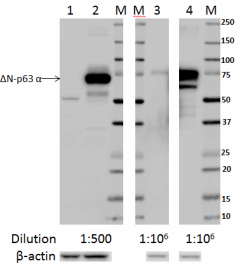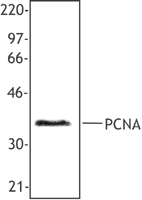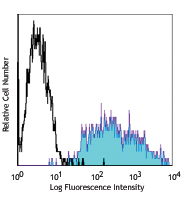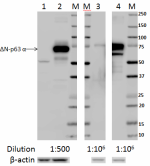- Clone
- W15093A (See other available formats)
- Regulatory Status
- RUO
- Other Names
- Tumor protein p63, p63, Chronic ulcerative stomatitis protein (CUSP), Keratinocyte transcription factor (KET), Tumor protein p73-like (p73L), TP63
- Isotype
- Mouse IgG2b, κ
- Ave. Rating
- Submit a Review
- Product Citations
- publications

-

15 µg total protein from NIH3T3 (lane 1), HaCat (lane 2) and 10 µg total protein from 293E overexpressed with TA-p63α (lane 3) and ΔN-p63α (lane 4) were resolved by electrophoresis (4-20% Tris-glycine gel), transferred to nitrocellulose, and probed with 1:500 (1 µg/ml) or 1:106 (0.0005 µg/ml) purified anti-TP63 antibody, clone W15093A (upper). Proteins were visualized using chemiluminescence detection by incubation with HRP goat anti-mouse-IgG secondary antibody. Direct-Blot™ HRP anti-β-actin Antibody was used as a loading control (lower). Lane M is the Molecular weight ladder. This antibody recognizes more than one isoform of ΔN-p63 which might be detected lower than 75kD. -

Chromatin Immunoprecipitations (ChIP) were performed with cross-linked chromatin samples from 4 X 106 of HaCaT cells with either A)1:100 dilution of Go-ChIP-Grade™ Purified anti-TP63 Antibody (clone W15093A, Cat. No. 687203) or B) equal amount of Purified Mouse IgG2b, κ Isotype Control Antibody (Clone MG2b-57, Cat. No. 401201) by using Go-ChIP-Grade™ Protein G Enzymatic Kit (Cat. No. 699904). The enriched DNA was purified and quantified by real-time qPCR using primers targeting human CDKN1A gene region and α-Satellite repeats. The amount of immunoprecipitated DNA in each sample is represented as signal relative to total amount of input chromatin. -

Chromatin Immunoprecipitations (ChIP) were performed with cross-linked chromatin samples from 4 X 106 of HaCaT cells with either A)1:100 dilution of Go-ChIP-Grade™ Purified anti-TP63 Antibody (clone W15093A, Cat. No. 687203) or B) equal amount of Purified Mouse IgG2b, κ Isotype Control Antibody (Clone MG2b-57, Cat. No. 401201) by using Go-ChIP-Grade™ Protein G Enzymatic Kit (Cat. No. 699904). The enriched DNA was purified and quantified by real-time qPCR using primers targeting human MDM2 gene region and α-Satellite repeats. The amount of immunoprecipitated DNA in each sample is represented as signal relative to total amount of input chromatin.
| Cat # | Size | Price | Quantity Check Availability | Save | ||
|---|---|---|---|---|---|---|
| 687202 | 100 µg | $347 | ||||
TP63 is a p53-related gene and shares similar domain organization with p53 and p73. Full length TP63 contains a N-terminal transactivation domain, a central DNA binding domain, and a C-terminal oligomerization domain responsible for the formation of a homotetramer. TP63 have several isoforms produced by alternative splicing. Most of the isoforms contain the DNA binding domain, but differ in their transactivation and oligomerization domains. The transactivation domain is present in the transcriptional active isoforms (TA-p63) and is absent in the truncated isoforms (ΔN -p63). TP63 is expressed in keratinocyte stem cells and is essential for the morphogenesis and development of ectodermal, orofacial, and limb tissues. TP63 deficient mice die soon after birth with skin and limb developmental defects.
Product DetailsProduct Details
- Verified Reactivity
- Human
- Antibody Type
- Monoclonal
- Host Species
- Mouse
- Immunogen
- Partial human TP63 recombinant protein (1-250 a.a.) expressed in E. coli.
- Formulation
- Phosphate-buffered solution, pH 7.2, containing 0.09% sodium azide.
- Preparation
- The antibody was purified by affinity chromatography.
- Concentration
- 0.5 mg/ml
- Storage & Handling
- The antibody solution should be stored undiluted between 2°C and 8°C.
- Application
-
WB - Quality tested
ChIP - Verified - Recommended Usage
-
Each lot of this antibody is quality control tested by Western blotting. For Western blotting, the suggested use of this reagent is 0.5 - 2.0 µg per mL (1:250-1:1000 dilution). For ChIP applications, the suggested dilution is 1:50 - 1:200 by volume. It is recommended that the reagent be titrated for optimal performance for each application.
- Application Notes
-
Application Notes: This clone predominantly recognizes ?N-p63, and weakly crosses react with TA-p63. Both ?N-p63 and TA-p63 have multiple isoforms, the largest isoforms are 66kD and 77kD respectively. This antibody recognizes more than one isoform of ?N-p63.
- Product Citations
-
- RRID
-
AB_2616941 (BioLegend Cat. No. 687202)
Antigen Details
- Structure
- p53 family of transcription factors. 12 reported isoforms produced by alternative splicing. Predicted molecular weight ranged from 44.7kD to 76.8kD.
- Distribution
-
Nuclear.
- Function
- TP63 acts as a transcriptional activator or repressor, is essential for limb formation, epidermal morphogenesis, and epithelial stem cell regeneration.
- Interaction
- Forms a homotetramer. Interacts with HIPK2, SSRP1, WWP1, PDS5A, and NOC2L.
- Biology Area
- Cell Biology, Transcription Factors
- Antigen References
-
1. Katoh I, et al. 2016. Cell Cycle 15:699.
2. Candi E, et al. 2014. Hum. Mutat. 35:702.
3. Chari NS, et al. 2013. Cell Death Differ. 20:1080.
4. Vasmatzis G, et al. 2012. Blood 120:2280.
5. Scott DW, et al. 2012. Blood 119:4949.
6. Miki D, et al. 2010. Nat. Genet. 42:893. - Gene ID
- 8626 View all products for this Gene ID
- Specificity (DOES NOT SHOW ON TDS):
- TP63
- Specificity Alt (DOES NOT SHOW ON TDS):
- TP63
- App Abbreviation (DOES NOT SHOW ON TDS):
- WB,ChIP
- UniProt
- View information about TP63 on UniProt.org
Related Pages & Pathways
Pages
Related FAQs
Other Formats
View All TP63 Reagents Request Custom Conjugation| Description | Clone | Applications |
|---|---|---|
| Purified anti-TP63 | W15093A | WB,ChIP |
Customers Also Purchased
Compare Data Across All Formats
This data display is provided for general comparisons between formats.
Your actual data may vary due to variations in samples, target cells, instruments and their settings, staining conditions, and other factors.
If you need assistance with selecting the best format contact our expert technical support team.
 Login/Register
Login/Register 














Follow Us